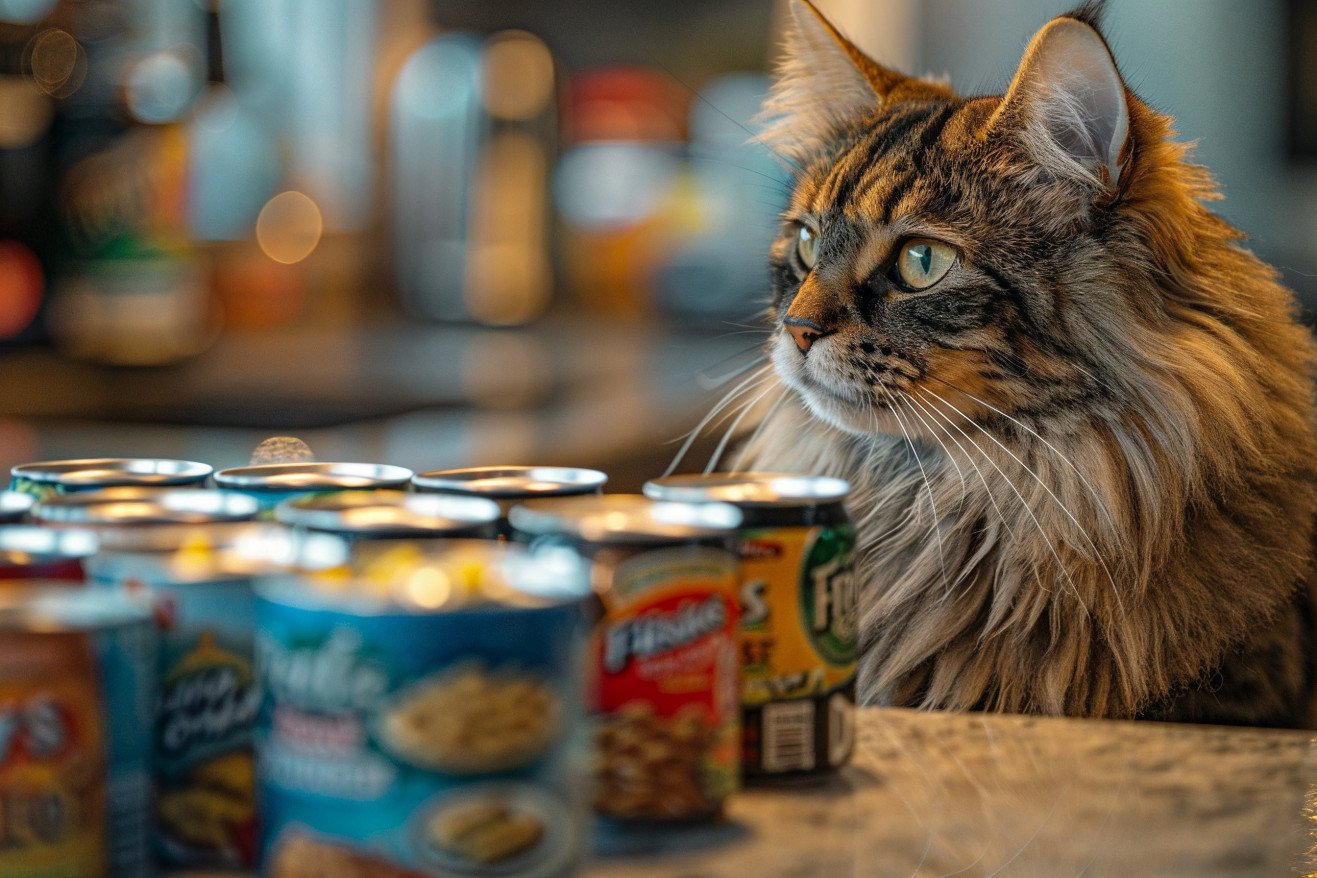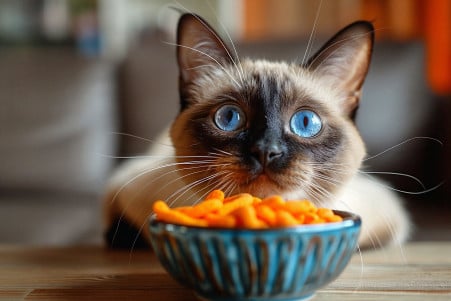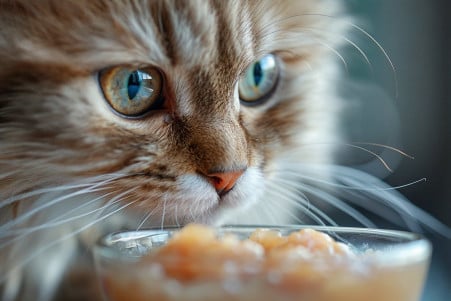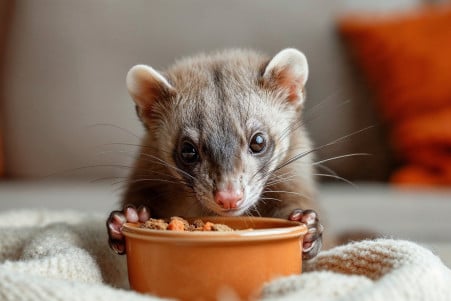Friskies Cat Food - Is It Bad for Your Feline Friend?
21 April 2024 • Updated 21 April 2024

If you're feeding your cat Friskies wet and dry cat food, you may be worried about the impact it's having on your pet's health. Friskies cat food is known for being a lower quality option that's full of fillers, by-products, and artificial additives that can lead to a variety of health problems, including obesity, diabetes, urinary issues, and allergies in cats.
In this article, we'll go through in-depth information from veterinary nutritionists and studies on pet food to find out exactly how some of the ingredients in Friskies and other similar low-cost cat foods can affect your cat's health. By looking at the nutritional information and expert opinions, you'll have the information you need to make the best choices for your cat's diet and health.
Is Friskies bad for cats?
Cat Nutritional Requirements and Friskies' Ingredients
Cats are obligate carnivores, which means they have very specific nutritional requirements that can only be met by their diet. According to the Feline Health Center at Cornell University, cats need a diet that is high in animal-based protein, moderate in fat, and low in carbohydrates in order to be healthy. Protein is the only source of essential amino acids, including taurine and arginine, for cats because they can't make them on their own.
Looking at the ingredients in Friskies' Meaty Bits with Beef in Gravy wet cat food, we see that it includes a combination of meat by-products, named meats such as beef and chicken, grains like wheat gluten, artificial additives, and vitamins and minerals. While it does include animal protein, the fact that it includes low-quality ingredients like meat by-products is a concern according to BetterVet. In addition, the inclusion of grains and carbohydrate sources like modified corn starch may be too high for an obligate carnivore as IAMS points out.
Nutritionists and veterinarians recommend that cat owners look for cat food that includes high-quality, named protein sources as the first ingredients and that is low in carbohydrates. According to The Honest Kitchen, cat food should not include by-products, artificial colors and flavors, or added sugars. When Friskies is evaluated based on these recommendations, there are several nutritional concerns that could potentially impact your cat's health and well-being in the long run.
Recalls, Lawsuits, and Other Issues With Friskies
Friskies has been the subject of some controversy in recent years due to recalls and lawsuits. In 2011, Friskies issued a voluntary recall of a dry cat food product due to possible salmonella contamination, although no pets were sick at the time, according to Petful. Since then, there have been unverified reports on the internet of contamination in certain lots of Friskies canned cat food, but Purina has said that there are no problems with the products.
More serious are two class-action lawsuits filed against Purina. One claims that Friskies and other Purina pet foods contain glyphosate, a substance that has been shown to cause cancer in animals, according to reports by Truth in Advertising and ClassAction.org. The other lawsuit alleges that Purina's 'natural' cat foods, including Friskies, actually contain synthetic ingredients, which goes against the products' marketing, as explained in this article on ClassAction.org.
In addition, the FDA has previously sent a warning letter to a Purina pet food facility for violations of federal regulations, which, according to Truth About Pet Food, may have affected Friskies products. Although no recalls have been made, these incidents have led to questions about the safety and quality of Friskies cat food.
How Does Friskies Measure Up in Terms of Quality and Price?
Friskies is one of the most budget-friendly options for cat food, which makes it an attractive choice for pet owners who are watching their wallets. However, the brand only scored a 34 out of 60 on the Cats.com expert rating system, in part because of the quality of the ingredients it uses and the lack of variety in its offerings.
In addition, there have been some customer complaints about the brand, including finding plastic in cans and cats not wanting to eat certain flavors, according to Catster. While the price point is a plus, Friskies may not be the best option for cats with special dietary requirements or health issues.
For those who are looking to save money, Purina's website says that Friskies' wet cat food options are generally better than its dry food options, which are higher in carbs and lower in protein.
Better Alternatives to Friskies Cat Food
For those who want to provide their pets with better nutrition, there are several cat food brands that experts and vets recommend as better alternatives to Friskies. According to Why Cat Why, some of the best cheap wet food options are Natural Balance, Newman's Own, and Sheba, which are all better than Friskies in terms of nutritional value.
If you're willing to spend more money, SELF magazine lists some of the best wet cat food brands, including Petcurean, Wellness Core, and Nature's Variety. Meanwhile, the best dry cat food brands according to Cats.com are Orijen, Petcurean, Acana, and Wellness Core.
No matter your price range, experts recommend that cat owners choose a food that's made with high-quality protein, low carbs, and meets AAFCO nutritional standards. This will ensure that your cat gets the nutrition they need to stay healthy.
Key Takeaways: How to Make the Best Choice for Your Cat
Friskies cat food is widely considered to be a low-quality brand because it contains fillers, by-products, and artificial ingredients. That said, it is also one of the most affordable options on the market. That said, if your cat has any specific dietary needs or health issues, you may want to consider other options. In addition, there have been a number of recalls and lawsuits that have called into question the safety and quality of Friskies cat food.
In general, the best cat foods are those that contain high-quality protein, low carbs, and no artificial ingredients. That said, the most important thing is to consider your cat's specific needs and consult with a vet to make sure you are making the best choice.


